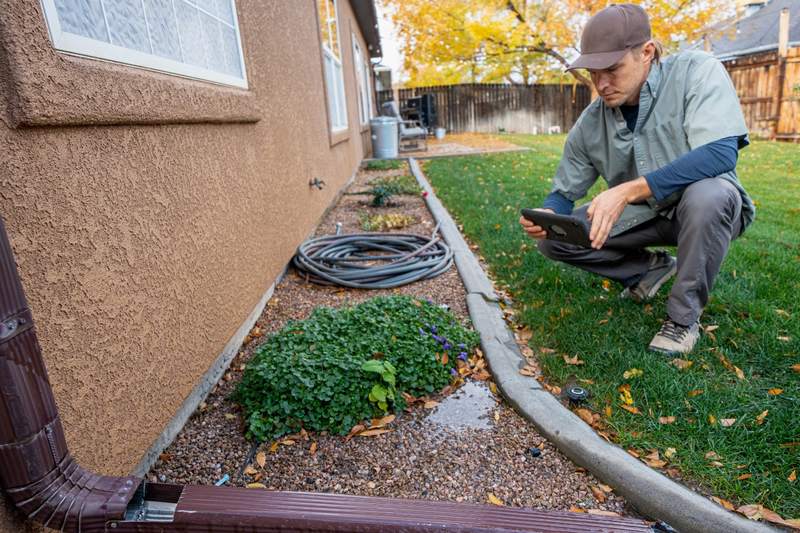Once your offer on a home has been accepted, you’re in the final stretch of your homebuying journey. Moving to a new home is exciting, but it’s important to do your due diligence before the closing date — and that includes getting a home inspection.
A home inspection gives you the chance to identify any problems or flaws with the property, and ensures that it’s in the expected condition. Knowing how long the inspection takes helps inform your closing timeline so you can factor in enough time to address any potential issues.
Key Takeaways:
- Getting a home inspection helps you avoid unforeseen problems after closing on the home.
- The home inspection timeline varies depending on a variety of factors, including the expertise of the inspector, as well as the condition, size, and age of the home.
- After the inspection, it’s important to address any issues with the home before closing.
What Is a Home Inspection?
A home inspection is a process where a professional inspector examines a property and reports any problems. The home inspection report will detail any recommended repairs based on defects they found or violations of local building code.
The home inspection timeline can be broken down into three steps: scheduling the inspection, the visit from the inspector, and receiving the inspection report.
Why do I need a home inspection?
If you’re buying a home, getting a home inspection is key to protecting your investment. The inspector can identify any major problems with the home before you purchase it and find out for yourself.
Imagine you make an offer to buy a home. It appears to be in decent shape, so you skip the home inspection to save money and strengthen your offer. Your offer is accepted by the seller, and you close on the home and move in.
A few weeks later, you go into the attic during a storm and discover multiple leaks. You also find some mold in the basement that you didn’t notice when touring the home.
A home inspection could have identified these issues before you bought the property, and given you a chance to negotiate with the seller or back out of the deal. Now, you may have to pay tens of thousands of dollars to remediate the problems by replacing the roof and removing the mold.
Home inspection contingency
A home inspection contingency is a clause in your purchase and sale agreement that gives you the right to back out of the deal if the inspection reveals issues with the home.
For example, you might include a home inspection contingency that lets you back out if the inspector identifies repairs that cost more than $10,000. If that does happen, you can renegotiate with the seller, ask them to pay for the repairs, or walk away from the deal.
Without this contingency in place, you would have to forfeit your earnest money to back out.
What does an inspector look at?
An inspector will examine the interior and exterior of the home; check the condition of the electrical, plumbing, and heating, ventilating, and air conditioning systems; and generally inspect the home with a very careful eye.
Inspectors won’t check certain things — such as pools or solar panels — or test for asbestos.
Home Inspection Timeline
Once a seller accepts your offer, it’s important to promptly schedule a home inspection. It typically takes three to four days to complete the home inspection and receive the report.
Scheduling the home inspection can be the biggest variable in the timeline, because some inspectors are busier than others. Conservative estimates can place the home inspection timeline at two weeks.
Scheduling the inspection: 1 to 10 days
You should schedule an inspection as soon as possible after your offer is accepted. Depending on the inspector’s availability, you may have to wait more than a week before they’re free to inspect the home.
Home visit from the inspector: 2 to 4 hours
On the day of the home inspection, it’s a good idea to be present and meet the inspector at the property. This gives you the chance to ask questions and to see any issues they identify in person.
“A typical inspection will take between two to four hours depending on the size of the home,” says Travis Wyman, a Realtor in Lakeville, Minnesota. “Some inspections may be longer depending on the size of the home. For large homes, many inspection companies will have multiple inspectors to help reduce the time it takes for the inspection.”
The time it takes for an inspector to gather the information they need can vary. A rule of thumb is that a 2,000-square-foot property takes two to three hours to inspect, and for every additional 500 square feet of living space, an extra 30 minutes should be added on.
Receiving the report: 1 to 4 days
The inspector will complete a detailed report after finishing the home inspection. This document can be dozens of pages long, and it will outline every aspect of the home that the inspector examined. The inspector will describe what they noticed and if the home’s systems need repairs. The report often will come with photos of the home for reference.
The report may also come with a home inspection guarantee, which reimburses you for any problems the inspector missed, up to a specified amount. The guarantee is typically honored for 90 days after closing, or another specified time period.
Factors That Affect the Home Inspection Timeline
The home inspection timeline varies depending on the home and the inspector. Some factors that influence the duration of an inspection include:
- The condition of the home. A home that is in great condition can be easier to inspect than one with many issues. Producing the report will take less time because the home has fewer problems to identify.
- The inspector’s experience. An experienced inspector typically can conduct a home inspection and produce a report more quickly than a novice.
- The size of the home. Larger homes can take longer to inspect.
- The age of the home. Newer homes are often in better shape than older ones. Older homes also are less likely to be up to modern building codes. If this is the case, there will be more problems to detail in the report.
- The number of major systems. It can take 10 minutes to inspect a water heater, and 30 minutes to inspect an HVAC system.
- The number of amenities. Homes with more amenities take more time to inspect. Keep in mind that home inspections don’t typically check pools or hot tubs.
- The type of foundation. Older homes may have foundations made from slate or soil, which can create problems over time and result in a longer inspection. Homes with basements or crawl spaces also take more time to inspect.
- The weather at the time of the inspection. Poor weather can make it more difficult for the inspector to examine certain parts of the home, like the roof.
- The number of questions asked during the inspection. Asking questions during an inspection is advisable, but it does mean that the inspection will take longer.
What To Do After the Home Inspection
Once the home inspection is finished, you have a few things to do before you can close on the home.
Dispute any issues
Inspectors are trained professionals, but they still can make mistakes. If you notice any errors in the report, you’ll need to bring them up and dispute them as soon as possible, because a second home inspection may be required.
Request any necessary repairs
Next, look at the major problems that were identified, and consider whether they’re deal breakers.
Wyman recommends listing problems in order of priority, with structural and safety issues at the top of the list.
“I also advise clients that all homes will have issues that come up in inspections,” Wyman says. “There is no such thing as a perfect inspection or home. Buyers need to decide what they are okay leaving as is, what they might want to fix on their own after closing on their purchase, and what they would like fixed before closing.”
If your inspector identifies major defects with the home, you can ask the seller to repair those problems before closing. You also can ask them to offer a credit equal to the repair cost. This will lower the price of the home and prevent delays with your move-in date, leaving you with more money to handle repairs on your own.
Close on the home
When the home is in a condition that you’re satisfied with — or if you’ve negotiated a new price with the seller — you’re ready to close on the home. Once you sign the paperwork that transfers the property’s ownership and get handed the keys, the home is yours.
Home Inspection Timeline FAQ
Here are answers to frequently asked questions about the home inspection timeline.
The home inspection timeline may vary from state to state, but it usually takes a week or two regardless of the home’s location.
It’s advisable to attend the home inspection so you can better understand the home you’re buying.
“The benefit to this is that you have the home inspector there to point out and explain what they are finding and seeing, instead of looking at the small picture on a 38-page report,” says Katie Moe, founding partner and Realtor at Connect California Homes, a real estate agency in Pleasanton, California.
A home inspection happens well before closing and helps ensure there are no major defects in a home. The final walk-through happens right before closing and allows you to personally check if the home is in the expected condition, the seller’s belongings are removed, and you’re ready to move in.
The Bottom Line on How Long a Home Inspection Takes
A home inspection is essential when buying a home, but it can take a week or two from scheduling the inspection to receive the report. Understanding this timeline will help you avoid delays during closing and inform your move-in date so you can begin life in your new home on the right foot.






